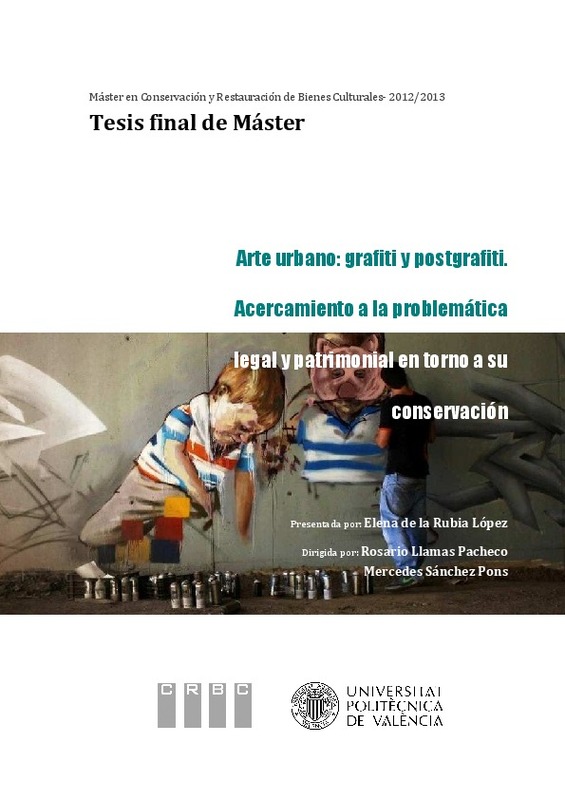JavaScript is disabled for your browser. Some features of this site may not work without it.
Buscar en RiuNet
Listar
Mi cuenta
Estadísticas
Ayuda RiuNet
Admin. UPV
Arte urbano: grafiti y postgrafiti. Acercamiento a la problemática legal y patrimonial en torno a su conservación
Mostrar el registro sencillo del ítem
Ficheros en el ítem
| dc.contributor.advisor | Llamas Pacheco, Rosario
|
es_ES |
| dc.contributor.advisor | Sánchez Pons, Mercedes
|
es_ES |
| dc.contributor.author | Rubia López, Elena de la
|
es_ES |
| dc.date.accessioned | 2014-07-31T07:01:54Z | |
| dc.date.available | 2014-07-31T07:01:54Z | |
| dc.date.created | 2013-09-11 | |
| dc.date.issued | 2014-07-31T07:01:54Z | |
| dc.identifier.uri | http://hdl.handle.net/10251/39193 | |
| dc.description.abstract | [EN] Illegal street art and in specific graffiti and post graffiti are an international art movement, which is characterised - amongst other questions - by the legal conflicts, which they evoke. It finds itself at an complicated point, as it resides between the laws that protect the artist and its work, like the law of intellectual property or the law of patrimony, and the castigatory laws of the penal code. Although there is a clearly more direct connection of this movement with the fines and the penalty, that have been intensified the past years, the artistic and social acknowledgment, which some of these works are obtaining, opens a new window towards the legal protection and the author’s rights. This mentioned acknowledgment gives place to the search of conservative actions and to an approach to the concept of patrimony, mainly caused by the social demand. The graffiti is converting to a strong sign of identification of many of the contemporary societies to the extent, that the “legal exception” and the interest for its conservation and restoration stop being a eccentricity | es_ES |
| dc.description.abstract | [ES] El arte urbano ilegal y en concreto el grafiti y postgrafiti es un movimiento artístico internacional que se caracteriza entre otras cuestiones por los conflictos legales que genera. Se encuentra en un punto complicado, ya que se sitúa peligrosamente entre las leyes que protegen al artista y a su obra, como la Ley de Propiedad Intelectual o la Ley de Patrimonio, y las leyes sancionadoras del Código Penal. Aunque el vínculo de este movimiento es claramente más directo con las multas y sanciones, que se han ido endureciendo en los últimos años, el reconocimiento artístico y social que algunas de estas obras están adquiriendo abre una nueva ventana hacia la protección legal y los derechos del autor. Dicho reconocimiento está dando lugar a la búsqueda de actuaciones conservativas y a un acercamiento al concepto de patrimonio causado principalmente por el reclamo social. El grafiti se está convirtiendo en un fuerte signo de identificación de muchas de las sociedades contemporáneas de tal magnitud que la “excepción legal” y el interés por su conservación dejan de ser una excentridad | es_ES |
| dc.format.extent | 90 | es_ES |
| dc.language | Español | es_ES |
| dc.publisher | Universitat Politècnica de València | es_ES |
| dc.rights | Reconocimiento - No comercial - Sin obra derivada (by-nc-nd) | es_ES |
| dc.subject | Grafiti | es_ES |
| dc.subject | Conservación | es_ES |
| dc.subject | Patrimonio | es_ES |
| dc.subject | Legal | es_ES |
| dc.subject | Graffiti | es_ES |
| dc.subject | Restoration | es_ES |
| dc.subject | Patrimony | es_ES |
| dc.subject.classification | PINTURA | es_ES |
| dc.subject.other | Máster Universitario en Conservación y Restauración de Bienes Culturales-Màster Universitari en Conservació i Restauració de Béns Culturals | es_ES |
| dc.title | Arte urbano: grafiti y postgrafiti. Acercamiento a la problemática legal y patrimonial en torno a su conservación | es_ES |
| dc.type | Tesis de máster | es_ES |
| dc.rights.accessRights | Abierto | es_ES |
| dc.contributor.affiliation | Universitat Politècnica de València. Servicio de Alumnado - Servei d'Alumnat | es_ES |
| dc.description.bibliographicCitation | Rubia López, EDL. (2013). Arte urbano: grafiti y postgrafiti. Acercamiento a la problemática legal y patrimonial en torno a su conservación. http://hdl.handle.net/10251/39193 | es_ES |
| dc.description.accrualMethod | Archivo delegado | es_ES |






